-
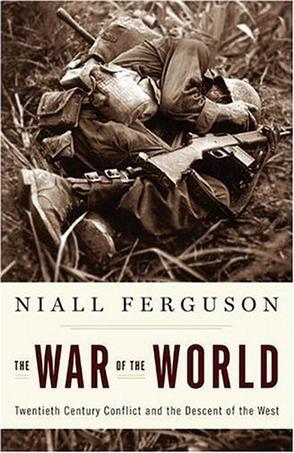
The War of the World
Niall Fergusson's most important book to date-a revolutionary reinterpretation of the modern era that resolves its central paradox: why unprecedented progress coincided with unprecedented violence and why the seeming triumph of the West bore the seeds of its undoing.
From the conflicts that presaged the First World War to the aftershocks of the cold war, the twentieth century was by far the bloodiest in all of human history. How can we explain the astonishing scale and intensity of its violence when, thanks to the advances of science and economics, most people were better off than ever before-eating better, growing taller, and living longer? Wherever one looked, the world in 1900 offered the happy prospect of ever-greater interconnection. Why, then, did global progress descend into internecine war and genocide? Drawing on a pioneering combination of history, economics, and evolutionary theory, Niall Ferguson-one of Time magazine's "100 Most Influential People"-masterfully examines what he calls the age of hatred and sets out to explain what went wrong with modernity.
On a quest that takes him from the Siberian steppe to the plains of Poland, from the streets of Sarajevo to the beaches of Okinawa, Ferguson reveals an age turned upside down by economic volatility, multicultural communities torn apart by the irregularities of boom and bust, an era poisoned by the idea of irreconcilable racial differences, and a struggle between decaying old empires and predatory new states. Who won the war of the world? We tend to assume it was the West. Some even talk of the American century. But for Ferguson, the biggest upshot of twentieth-century upheaval was the decline of Western dominance over Asia.
A work of revelatory interpretive power, The War of the World is Niall Ferguson's masterwork. -

Modern Architecture
-
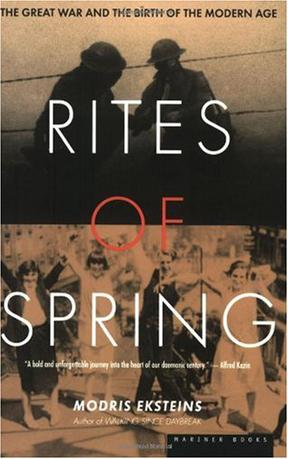
Rites of Spring
Dazzling in its originality, witty and perceptive in unearthing patterns of behavior that history has erased, RITES OF SPRING probes the origins, the impact, and the aftermath of World War I -- from the premiere of Stravinsky's ballet The Rite of Spring in 1913 to the death of Hitler in 1945. "The Great War," as Modris Eksteins writes, "was the psychological turning point . . . for modernism as a whole. The urge to create and the urge to destroy had changed places." In this "bold and fertile book" (Atlantic Monthly), Eksteins goes on to chart the seismic shifts in human consciousness brought about by this great cataclysm through the lives and words of ordinary people, works of literature, and such events as Lindbergh's transatlantic flight and the publication of the first modern bestseller, ALL QUIET ON THE WESTERN FRONT. RITES OF SPRING is a remarkable and rare work, a cultural history that redefines the way we look at our past and toward our future. -
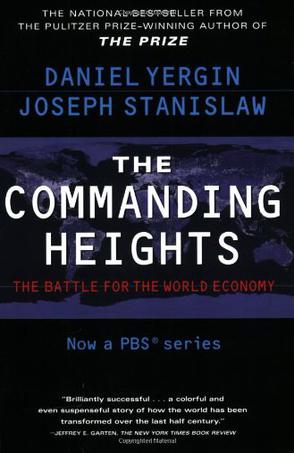
The Commanding Heights
Book Description The Pulitzer Prize-wimming author of The Prize joins a leading expert on the global economy to present an incisive narrative of the risks and opportunities that are emerging as the balance of power shifts around the world between governments and markets -- and the battle over globalization comes front and center. The Commanding Heights is essential for understanding the struggle over the "new rules of the game" for the twenty-first century. Amazon.com The "commanding heights," according to Pulitzer Prize-winner Daniel Yergin and international business advisor Joseph Stanislaw, are those dominant enterprises and industries that form the high economic ground in nations around the globe. In their analysis of the new world economy, The Commanding Heights: The Battle Between Government and the Marketplace That Is Remaking the Modern World, they examine "the individuals, the ideas, the conflicts, and the turning points" that are responsible. And by considering events such as the ongoing Asian monetary crisis, they suggest what the ultimate interconnection of financial markets might mean in the future. The Wall Street Journal, Kenneth Minogue Daniel Yergin and Joseph Stanislaw write clearly and have the journalist's talent for fixing personalities in our minds with biographical detail. No one could ask for a better account of the world's political and economic destiny since World War II. The New York Times Book Review, Jeffrey E. Garten It is an extraordinarily ambitious undertaking, combining the history of milestone events in countries as diverse as France and India, the biography of leaders as different as Margaret Thatcher and Deng Xiaoping and the evolution of ideas ranging from Keynesian economics ... to the Chicago school of free markets. But it is also a brilliantly successful project, a colorful and even suspenseful story of how the world has been transformed over the last half-century. From Booklist Yergin and Stanislaw's global tour d'horizon doesn't extrapolate from the discrediting of various shades of socialism that free markets are here to stay. The situation varies from country to country. The authors report on the post^-World War II performance of significant national economies and, moreover, on the politicians who, starting with Margaret Thatcher, advocated the disengagement of the state from the economy. This work complements Robert Skidelsky's Road from Serfdom (1996), a readable analysis of how the predictions of free-market economist F. A. Hayek came true. The authors supplement their research with interviews of influential economists and politicians over the past two decades, such as those who implemented "shock therapies" in ex-communist countries. The authors' judgments are reasoned and seasoned, far from podium-pounding homilies on the free market; rather, they explain why the welfare state was so appealing after the war, then how it gradually sputtered into 1970s stagflation. Renders wide-ranging acquaintance with the basic ideas of contemporary economics. Gilbert Taylor Los Angeles Times Sunday Book Review, Robert Heilbroner ...a book that must be read by anyone who responds to its powerful subtitle.... It has been a long time since I have read a book in which intelligence and readability were so felicitously mixed. Commentary, Gary Rosen Yergin and Stanislaw trace the course of our century's enchantment with central planning from its first hopeful postwar expressions to its dissolution in recent decades under the relentless pressure of the marketplace and its partisans. It is a grand tale, and they relate it with admirable ambition and energy, even if in the end they fail to do it full justice. They rightly consider Hayek the leading thinker in the revolt against statism. The problem with Yergin and Stanislaw's presentation of his views is that it scants their essential aspect, which is political and legal. As they would have it, the confrontation between market and state basically concerns information, that is, which side knows more. For Hayek himself, however, the overriding reason state control of economies is "the road to serfdom" is that it vastly expands the opportunities for the governing class to serve its own narrow interests. Such messily political matters are not fundamental to Yergin and Stanislaw's account. This no doubt explains their strange insistence that the state may soon come roaring back to reclaim its place atop the commanding heights. Whatever misfortunes may befall the newly liberalized economies of the world, however, far too many people have learned that political power, even when exercised in the name of public-spirited economic ends, corrupts in direct proportion to the ambition of its reach. Book Dimension : length: (cm)23.4 width:(cm)15.5 -
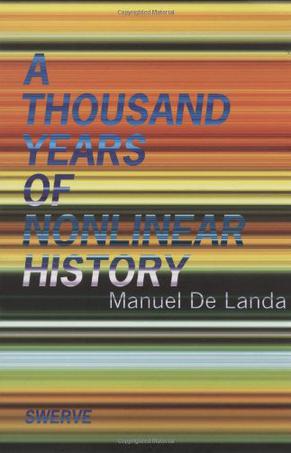
A Thousand Years of Nonlinear History
Following in the wake of his groundbreaking War in the Age of Intelligent Machines, Manuel De Landa presents a radical synthesis of historical development over the last one thousand years. More than a simple expository history, A Thousand Years of Nonlinear History sketches the outlines of a renewed materialist philosophy of history in the tradition of Fernand Braudel, Gilles Deleuze, and Felix Guattari, while also engaging the critical new understanding of material processes derived from the sciences of dynamics. Working against prevailing attitudes that see history as an arena of texts, discourses, ideologies, and metaphors, De Landa traces the concrete movements and interplays of matter and energy through human populations in the last millennium.De Landa attacks three domains that have given shape to human societies: economics, biology, and linguistics. In every case, what one sees is the self-directed processes of matter and energy interacting with the whim and will of human history itself to form a panoramic vision of the West free of rigid teleology and naive notions of progress, and even more important, free of any deterministic source of its urban, institutional, and technological forms. Rather, the source of all concrete forms in the West's history are shown to derive from internal morphogenetic capabilities that lie within the flow of matter-energy itself. -
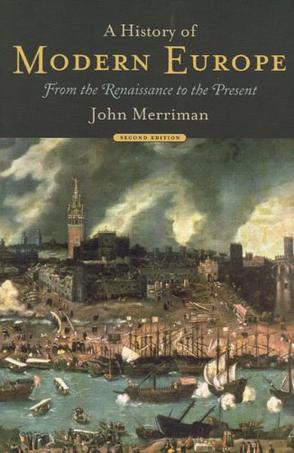
A History of MODERN EUROPE From the Renaissance of to the Present
A History of Modern Europe presents a panoramic survey of modern Europe from the Renaissance to the present day. A seasoned teacher and talented historian, Professor John Merriman offers a carefully crafted narrative that guides students through a vast amount of complex material, integrating the many aspects of the European experience into a larger, interconnected whole. A full ten percent shorter than its predecessor, the Second Edition has tightened organization throughout to make room for recent research and descriptions of the current issues and events that define Europe's role in the world today. Height (mm) 223 Width (mm) 155